|
|
|
Sort Order |
|
|
|
Items / Page
|
|
|
|
|
|
|
| Srl | Item |
| 1 |
ID:
146495
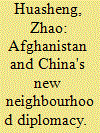

|
|
|
|
|
| Contents |
This article investigates the latest developments and changes in China's increasingly active diplomacy towards Afghanistan. This is interpreted from two perspectives. First, focusing on China's domestic perspective the author points out that under the ‘one belt, one road’ initiative, China's interests in Afghanistan have expanded, particularly in the area of transport; it has started seriously to consider Afghanistan as a transport corridor. The other perspective considers the withdrawal of US military forces and the International Security Assistance Force (ISAF) from Afghanistan in 2014, which has been followed by a critical transitional period. Concerned by these developments, China has increased its involvement and taken on more responsibilities, as demonstrated by the unprecedented frequency of Chinese senior officials’ visits to Afghanistan; the significant increase of bilateral aid to Afghanistan; and above all, the fact that Beijing has begun to coordinate negotiations between the Taliban and the Afghan government. The process of political reconciliation in the country will be extremely difficult and a quick solution is not to be expected. With regard to the idea that the Chinese are filling a ‘vacuum’ left by the US, the article argues that the so-called vacuum does not actually exist because the US military presence was temporary and the withdrawal of the US forces represents a return to the normal state of affairs. Also, excluding the US is not part of Beijing's policy in this area; rather, it is cooperating with the US and other countries in assisting Afghanistan.
|
|
|
|
|
|
|
|
|
|
|
|
|
|
|
|
| 2 |
ID:
146493
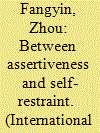

|
|
|
|
|
| Contents |
Since 2010, there has been obvious escalation of tensions in the South China Sea, coinciding with China's rise and the United States’ ‘pivot’ to Asia. Has China become more aggressive in its approach to the South China Sea? What strategic goal is China is pursuing in this area? Where does the South China Sea rank in China's overall foreign policy agenda? This article addresses these issues from the Chinese perspective. In the first part, the article discusses China's changing strategy and the leadership's thinking behind the changes. In the second part, it examines in detail several incidents involving China in the South China Sea, including confrontations with the Philippines over Scarborough Shoal and the Second Thomas Shoal and China's more recent land reclamation. The article argues that China's strategic goal in the South China Sea is a relatively modest one. The South China Sea disputes do not rank particularly highly among China's strategic priorities. To a great extent the handling of these issues is also subject to the dynamics of the overall relationship between China and the Association of Southeast Asian Nations (ASEAN).
|
|
|
|
|
|
|
|
|
|
|
|
|
|
|
|
| 3 |
ID:
146490
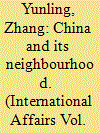

|
|
|
|
|
| Contents |
China and its neighbours are closely bound by geography. The rise of China presents new challenges and opportunities for the development of its neighbourhood relations and regional strategies. Currently, China's policy priority in its neighbourhood is active promotion of the construction of a community based on shared interests and a common destiny. The real challenge is that China's rise from a weak to a powerful state has triggered multiple and complex reactions and has required significant and profound adjustment of regional relationships. As a consequence there have been growing tensions in China's neighbourhood areas. Traditional Chinese culture sets the highest value on ‘peace and harmony’, commends the ‘defusing’ of contradictions and pursues the result of ‘reconciliation’. Now that China is getting strong and is able to make choices as it wishes, the time has come for it to display its ‘culture of harmony’.
|
|
|
|
|
|
|
|
|
|
|
|
|
|
|
|
| 4 |
ID:
146486
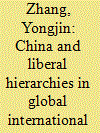

|
|
|
|
|
| Contents |
This article investigates the entanglement of the rising Chinese power with the liberal global order in negotiating for normative change. Drawing upon the English School theoretical perspective, it argues that three hierarchical constructs of liberal persuasion co-exist in and cohabit the global international society today. They are, namely, the legalized hegemony as seen in the UN Charter-based liberal pluralism; the changing normative order of emerging solidarist and anti-pluralist formation that purposively creates unequal sovereigns; and the liberal global governance order that moves predominantly in the direction of state-centric solidarism. As an emerging power with an authoritarian regime, China's entanglement with these liberal hierarchical constructs is multifaceted with complex dynamics. The article argues specifically that three differentiated strategic approaches have been developed by China in this entanglement: to defend liberal pluralism in the legalized hegemony; to contest liberal cosmopolitan anti-pluralism in the changing normative order; and to endorse state-centric solidarism with regard to the construction of a liberal global governance order. If they reflect a rising China's preferences of order construction, they also constitute an important part of China's engaging negotiations for normative change in international society. The agency China exercises in this regard helps explain the limited consensus among Great Powers as to the ‘central direction’ for the evolving global order. The preferences of China as the second among equals in the Great Power club matter greatly in understanding the contention between pluralism and solidarism in the changing raison de système of contemporary global international society.
|
|
|
|
|
|
|
|
|
|
|
|
|
|
|
|
| 5 |
ID:
146500
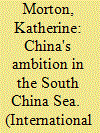

|
|
|
|
|
| Contents |
China's expanding presence in the South China Sea is now a major source of escalating tensions leading to a spiral of confrontation with the United States and the littoral states of east Asia. Under these conditions, conventional analysis suggests that serious conflict is almost inevitable. This article provides an alternative perspective by situating China's growing ambition within the broader transformation of maritime order in the contemporary era. On the basis of a new interpretation of maritime order, the study provides a deeper examination of China's motivations in relation to the maritime disputes, US–China strategic competition, and Xi Jinping's new strategy to achieve the great rejuvenation of the Chinese nation. The analysis of the legal, strategic and political dimensions of China's positioning in the South China Sea suggests that maritime nationalism rather than the quest for maritime hegemony is a central motivation driving Chinese actions. A second important insight is that the current approach is strengthening China's control, but undermining its legitimacy in the eyes of other major powers and stakeholders. By focusing on legitimacy as an organizing principle in maritime affairs, it becomes clear that the Chinese leadership stands to gain from integrating its ambition more fully into the evolving maritime order.
|
|
|
|
|
|
|
|
|
|
|
|
|
|
|
|
| 6 |
ID:
146484
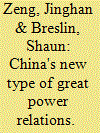

|
|
|
|
|
| Contents |
The rise of China has been reshaping how the country sees its own role in the world. China has become increasingly willing to move from being a norm and system taker to a norm and system shaper (if not yet maker). One example is Xi Jinping's promotion of ‘a new type of Great Power relations’ designed to create a strategic space in which to operate. By using a mixed quantitative/qualitative analysis, we analyse 141 Chinese articles titled with ‘new type of Great Power relations’. We find that although Chinese analysts and policy makers rejected the idea of a G2 in 2009, the mainstream discourse has rapidly shifted to what we call a ‘G2 with Chinese characteristics’ which indicates a fundamental shift in Chinese evaluation of the power status of itself and others. While some Chinese scholars consider China to have already achieved the status as the world's No. 2 or even a superpower, the mainstream discourse views China as both a Great Power and a rising power at the same time. This, we argue, moderates the expectations of what China can and should do to resolve global problems despite its great power status.
|
|
|
|
|
|
|
|
|
|
|
|
|
|
|
|
| 7 |
ID:
146491
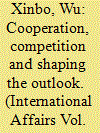

|
|
|
|
|
| Contents |
The United States has long maintained a significant political, economic and security presence in the Asia–Pacific region and has been a major factor shaping China's geopolitical and geo-economic environment. Over the last few years, China has demonstrably attached higher priority and devoted more resources to its neighbourhood diplomacy. This article examines the impact of the so-called ‘US factor’ on this recent shift in Beijing's international strategy under the new leadership of Xi Jinping. It looks at both cooperation/coordination and competition/conflict between China and the United States in a number of regional security issues in China's neighbourhood, such as in the Korean peninsula, Afghanistan and the South and East China Seas. It argues that it is principally the Obama administration's ‘rebalance to Asia’ strategy that has prompted China to take a number of initiatives to attend to its neighbourhood diplomacy. As Washington rebalances to Asia and Beijing rebalances to its neighbourhood, interactions between China and the US on China's periphery have intensified, which in turn has a significant impact on the configuration of China's neighbourhood diplomacy, as well as on the evolving regional order.
|
|
|
|
|
|
|
|
|
|
|
|
|
|
|
|
| 8 |
ID:
146483
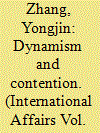

|
|
|
| 9 |
ID:
146506
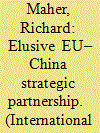

|
|
|
|
|
| Contents |
In 2003 the European Union announced that it had launched a ‘comprehensive strategic partnership’ with China. This policy was intended to elevate EU–China relations beyond prosaic trade and investment issues to address some of the world's most pressing political and security challenges. Anything approaching a comprehensive strategic partnership over the past decade linking the EU and China has failed to materialize, however. This article clarifies and examines those issues that have impeded a closer EU–China alignment, and that hold the greatest potential for future discord in their bilateral relations. It explains how clashing political values, diverging geopolitical interests and priorities, and competing conceptions of world order has limited and will continue to limit the scope and depth of any EU–China strategic relationship. EU–China relations are today, and are likely to remain, contested, uneven and—apart from trade and investment—shallow, and embody a limited rather than a strategic partnership. As China's economic, military and political power continues to expand, the EU will need a new conceptual framework towards Beijing. This framework must be able to facilitate cooperation on issues and policies in which there is real potential for mutual gain, but also manage effectively the inevitable tensions and disagreements that arise.
|
|
|
|
|
|
|
|
|
|
|
|
|
|
|
|
| 10 |
ID:
146488


|
|
|
|
|
| Contents |
Why has China's foreign policy become more assertive since 2009, and what is driving Beijing's foreign policy orientations? Given the significance of China's rise over the past few decades, it is surprising that this question has not been subjected to systematic analysis as well as general investigation within scholarly research. This article serves to examine the sources of China's assertiveness using a system-level, unit-level and individual-level analysis. This article first looks at system-level explanations such as state power, external threats and national interests, and then considers unit-level factors including bureaucratic competition, struggles of the elite and the surge of nationalism. However, both system-level and unit-level explanations alone fail to account for China's more assertive foreign policy. This suggests that individual factors play a major role in explaining the country's more assertive external behaviour. This is especially the case when the perceptions of the political elite are deeply embedded in the state leader's preferences. This finding can enhance our understanding of why traditional explanations, that do not incorporate the role of the state leader, may fail to predict Chinese foreign policy behaviour. To understand better the implications of China's rise, therefore, we must take into account the role of the state leadership and its impact on China's growing influence in international politics.
|
|
|
|
|
|
|
|
|
|
|
|
|
|
|
|
| 11 |
ID:
146503
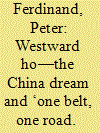

|
|
|
|
|
| Contents |
China's domestic politics and foreign policy have evolved considerably under President Xi Jinping. Domestically the regime has actively promoted the idea of the ‘China dream’ to restore optimism and enthusiasm about its future, particularly among young people. Yet it has also sought to differentiate the socialist China dream from any resemblance to the American dream. Its main emphasis is on making China ‘strong and powerful’ again. In foreign policy, the leadership has become more active. While China has pursued a more robust policy in the South China Sea, it has also launched two extremely ambitious long-term projects to expand land and maritime transport links between China and Europe, termed the ‘one belt, one road’ initiative. They aim to promote development of western China, but if successful, they should also help to transform economic relations across large parts of Eurasia. In geopolitical terms, they will expand China's shadow over regions of the world where hitherto its presence has been relatively modest. They should strengthen links with Europe, as well as with other countries along the routes, to counterbalance potentially conflictual relations with the US. However, success will require active and enthusiastic cooperation from many neighbours. For that reason the risks are as great as the ambition.
|
|
|
|
|
|
|
|
|
|
|
|
|
|
|
|
|
|
|
|
|